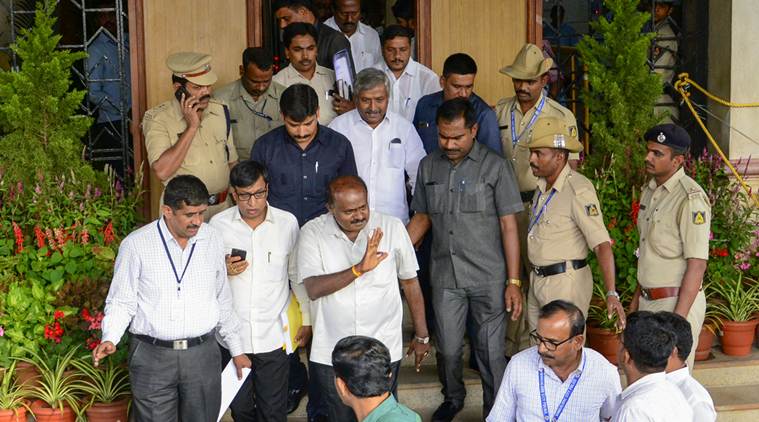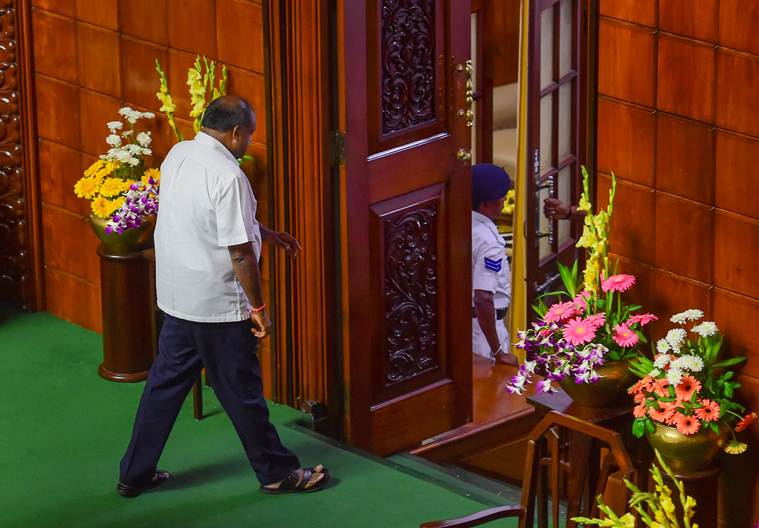
In an interim order on the eve of the crucial trust vote in the Karnataka Assembly Thursday, the Supreme Court Wednesday left it open to the Speaker to decide on the resignations of 15 rebel Congress and JD(S) MLAs but also ordered that the MLAs should not be “compelled” to attend the ongoing session of the House.
Hearing a plea by the rebels against Speaker K R Ramesh Kumar who has not accepted their resignations, a bench of Chief Justice of India Ranjan Gogoi and Justices Deepak Gupta and Aniruddha Bose said it was passing the order keeping in view the fact that Chief Minister H D Kumaraswamy’s government faces a trust motion Thursday.
Thirteen Congress and three JD(S) MLAs have resigned since July 6, technically reducing the numbers of the coalition from 117 to 101 compared to the BJP’s 105 in the 224-member House where the halfway mark is 113. However, the numbers will reduce only when the resignations are accepted by the Speaker or if the rebels are disqualified.
“The imperative necessity, at this stage, is to maintain the constitutional balance and the conflicting and competing rights that have been canvassed before us. Such an interim exercise has become prudent in view of certain time frame exercise that is in the offing in the Karnataka Legislative Assembly, particularly, the no-trust motion against the present Government, which we are told is due for being taken up on 18th July 2019”, said the bench.
Also Read | SC verdict not in our way, says Congress, will issue whip
“In these circumstances, the competing claims have to be balanced by an appropriate interim order, which according to us, should be to permit the Hon’ble Speaker of the House to decide on the request for resignations by the 15 Members of the House within such time frame as the Hon’ble Speaker may consider appropriate.”
The court also said that it was of the view that “in the present case the discretion of the Hon’ble Speaker while deciding the above issue should not be fettered by any direction or observation of this Court and the Hon’ble Speaker should be left free to decide the issue in accordance with Article 190 read with Rule 202 of the Rules of Procedure and Conduct of Business in Karnataka Legislative Assembly framed in exercise of the powers under Article 208 of the Constitution”.

However, the bench made it clear that “until further orders, the 15 Members of the Assembly, ought not to be compelled to participate in the proceedings of the ongoing session of the House and an option should be given to them that they can take part in the said proceedings or to opt to remain out of the same”.
Explained | Karnataka crisis: What was SC’s Kihoto Hollohan order of 1992, what is the role of Speaker?
The order noted that the hearing of the plea had raised the issue of whether resignations submitted by MLAs at a point of time earlier than petitions for their disqualification under the Tenth Schedule (anti-defection law) of the Constitution should be decided first or whether both should be taken up simultaneously or the disqualification proceedings should have precedence over the requests for resignation.
The bench said that this question “in the present case, having regard to the stage at which the above issues are poised in the light of the facts and circumstances surrounding the same…should receive an answer only at a later stage of the proceedings”.
Speaker Kumar welcomed the SC decision and said he would conduct himself responsibly in accordance with the principles of the Constitution. “With utmost humility, I welcome and respect the Supreme Court decision,” he said. “The Supreme Court has put extra burden on me, I will conduct myself responsibly in accordance with constitutional principles,” he told reporters in Kolar, his home town.